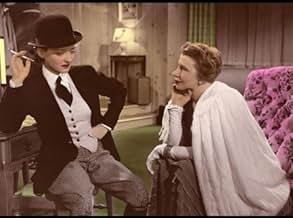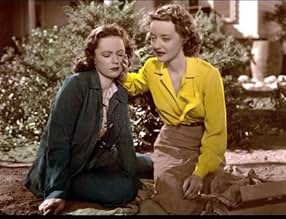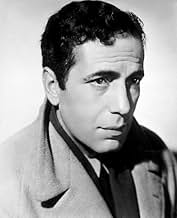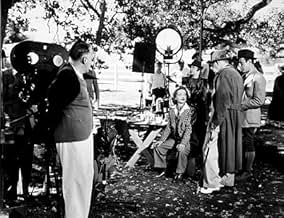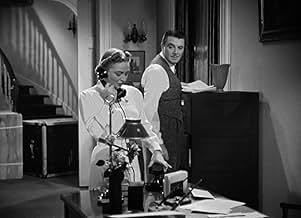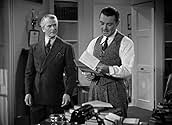IMDb-BEWERTUNG
7,4/10
13.036
IHRE BEWERTUNG
Füge eine Handlung in deiner Sprache hinzuA young socialite is diagnosed with an inoperable brain tumor, and must decide whether or not she'll meet her final days with dignity.A young socialite is diagnosed with an inoperable brain tumor, and must decide whether or not she'll meet her final days with dignity.A young socialite is diagnosed with an inoperable brain tumor, and must decide whether or not she'll meet her final days with dignity.
- Regie
- Drehbuch
- Hauptbesetzung
- Für 3 Oscars nominiert
- 5 Gewinne & 4 Nominierungen insgesamt
Black Ace
- Judith's Horse
- (Nicht genannt)
Marian Alden
- Judith's Friend
- (Nicht genannt)
Wilda Bennett
- Judith's Friend
- (Nicht genannt)
Diane Bernard
- Lucy - a Servant
- (Nicht genannt)
Empfohlene Bewertungen
By today's standards, "Dark Victory" might seem cliched. Of course, that could be because it was so greatly copied! Here is Bette Davis, a star in the fullness of her talent and ability. Bette simply shines; she owns this film from first frame to last. Ably supported by a wonderful cast (including a somewhat mis-matched Humphrey Bogart as an Irish-brogued horse trainer), it is still difficult to watch the film and not be constantly anticipating Bette's appearance in any scene she isn't in. The ending, even in those days, might have turned out either wimpy or waspish. In Bette's hands, it is neither. It works in a way that literally drains one of emotions. I might also add that, while revealing only a bare back, Bette shows more sensuality than a dozen of today's more "open" actresses.
There is an old disparaging adage about "showing the full gamut from a to b," in this movie Bette not only shows A to Z, but some letters that haven't been invented yet.
Despite my gushing over Ms. Davis, the film is solid in all departments. If you wish to experience when melodrama is great movie-making, see this film.
There is an old disparaging adage about "showing the full gamut from a to b," in this movie Bette not only shows A to Z, but some letters that haven't been invented yet.
Despite my gushing over Ms. Davis, the film is solid in all departments. If you wish to experience when melodrama is great movie-making, see this film.
When Bette Davis was in ball buster mode, watch out!! But when she decided to suffer nobly, she could suffer with the best of them.
In "Dark Victory," Davis plays a woman dying from the deadliest of deadly diseases---the vague, unnamed illness that beautiful actresses died of in movies from the 1930s. The symptoms never seem to be the same, but they're always tear-inducing. Here, they make Davis go blind and we know when the disease is getting worse because a fuzzy black halo begins to appear around the edges of the frame.
Actually, this movie is a rather pale companion to the ultimate Davis melodrama, "Now, Voyager." But it has perhaps my favorite line ever delivered in a Bette Davis movie. She's found out that her illness is fatal, and she's at dinner with the doctor who has kept this from her to protect her fragile soul. When the waiter comes to take her order, she says, "How about a nice big helping of..." pause, as she throws the most withering of withering stares at her companion ..."prognosis negative." That should really be on a bumper sticker somewhere.
As for the other actors.....wait, other actors? No one watches a Bette Davis movie to see other actors. I'm not even sure there were any other actors in this movie.
Grade: B
In "Dark Victory," Davis plays a woman dying from the deadliest of deadly diseases---the vague, unnamed illness that beautiful actresses died of in movies from the 1930s. The symptoms never seem to be the same, but they're always tear-inducing. Here, they make Davis go blind and we know when the disease is getting worse because a fuzzy black halo begins to appear around the edges of the frame.
Actually, this movie is a rather pale companion to the ultimate Davis melodrama, "Now, Voyager." But it has perhaps my favorite line ever delivered in a Bette Davis movie. She's found out that her illness is fatal, and she's at dinner with the doctor who has kept this from her to protect her fragile soul. When the waiter comes to take her order, she says, "How about a nice big helping of..." pause, as she throws the most withering of withering stares at her companion ..."prognosis negative." That should really be on a bumper sticker somewhere.
As for the other actors.....wait, other actors? No one watches a Bette Davis movie to see other actors. I'm not even sure there were any other actors in this movie.
Grade: B
Bette Davis always cited this as her favourite role: it is probably on a par with Margo Channing in ALL ABOUT EVE as the part which fans identify with as definitive Davis. Naturally, this 1939 film will look a little musty, corny and cliched to modern day viewers, but the poignant sincerity in which Davis instilled via her magnificent performance still has the ability to leave the viewer in helpless tears: you can be dumbfounded to think that something so obviously aimed at your tear ducts could succeed to induce the flow so completely and spontaneously! The role is based upon a 1934 play in which Tallulah Bankhead flopped. The character of Ann King was written especially for the film by director Edmund Goulding: as a kind of Greek Chorus so Judith wouldn't have to complain about the inevitable. Geraldine Fitzgerald, in her American film debut, does a wondrous job with the part of Ann: a beautifully etched supporting performance. As Michael O'Leary, Humphrey Bogart is unfortunately inept in the Irish brogue department (why couldn't they have simply cut out the accent?) and George Brent is adequately wooden as Dr. Frederick Steele whom Judy marries. Davis slams through a gooey collection of cliches in her nerviest style during the early segments but her metamorphasis into a vibrantly humbled married woman is quite a striking contrast to the selfishly brazen spoiled heiress: truly a multi-faceted performance. Ronald Reagan gets to play Alec, one of Judy's drunken swains, and Cora Witherspoon is memorable as the snotty Carrie. The last twenty minutes of the film are expertly crafted and timelessly tear-jerking: the movie sold more kleenex than any other of its day.
Judith is a wealthy Long Island society girl given to a dizzy lifestyle
Self-assured of her affluence and her faculty over men, she is unprepared for tragedy, which strikes in the form of a brain tumor
The underlying bravery and courage with which she faces this physical suffering eventually demonstrates the woman of substance that she is
Among her friends is Ann King (Fitzgerald), her secretary, and handsome young Alex Hamm (Reagan), who directs her toward brain specialist Dr. Frederick Steele (Brent). The doctor diagnoses her illness as one which will end her life within a year Judith falls in love with him and accepts his proposal of marriage When she discovers that her tumor is calamitous, she rejects the doctor's proposal considering it an act with compassion
Davis provides scene after scene with the special magic only she was able of bringing vividly
Swept into the current of events was Bogart playing an Irish horse trainer, who fails in an attempt to make love to her, yet encourages her to enjoy her time with her true love, George Brent
The film was remade in 1963 as "Stolen Hours" with Susan Hayward, and as a 1976 TV movie under its original title with Elizabeth Montgomery
Among her friends is Ann King (Fitzgerald), her secretary, and handsome young Alex Hamm (Reagan), who directs her toward brain specialist Dr. Frederick Steele (Brent). The doctor diagnoses her illness as one which will end her life within a year Judith falls in love with him and accepts his proposal of marriage When she discovers that her tumor is calamitous, she rejects the doctor's proposal considering it an act with compassion
Davis provides scene after scene with the special magic only she was able of bringing vividly
Swept into the current of events was Bogart playing an Irish horse trainer, who fails in an attempt to make love to her, yet encourages her to enjoy her time with her true love, George Brent
The film was remade in 1963 as "Stolen Hours" with Susan Hayward, and as a 1976 TV movie under its original title with Elizabeth Montgomery
There are three central performances in DARK VICTORY that deserve praise for their sincerity and complete believability--BETTE DAVIS as the spoiled heiress, GEORGE BRENT as the doctor who falls in love with her and GERALDINE FITZGERALD as the conscience of the story, feeling pity and love for her dearest friend.
Davis trounces around through the first half to show us what kind of energy and volatility is flaring beneath the surface--so full of life that when she realizes her illness bears the stamp of "prognosis negative", it's a shock to the audience as well as the actress. She's at her level best in all of the quieter moments--and never more impressive than in the final ten minutes of the film where her character must face the impending death with dignity and the knowledge that she has her husband's love and her best friend's devotion.
The scene in the garden with Fitzgerald at her side is the most luminous in the entire film. It's worth waiting for just to watch two great actresses at work.
Max Steiner's score is fitting at all times--even in the final moments when Bette goes up the stairs accompanied by his melancholy main theme. Edmund Goulding gets sensitive work from his entire cast--with the exception of Ronald Reagan who is given absolutely nothing in the way of character development except to look tipsy in every scene. To say that he is wasted is an understatement. So too is Henry Travers as the doctor who brought Davis into the world. Humphrey Bogart has been criticized for his Irish accent, but he's at least acceptable in a minor role as a horse trainer.
But the three central performances are what hold the film together--and make what is essentially a sob story work so beautifully.
Trivia: George Brent is very effective in the doctor role that was first offered to Basil Rathbone, but then withdrew after a very bad screen test in the part convinced the studio (and Rathbone) that he was all wrong for the role.
Davis trounces around through the first half to show us what kind of energy and volatility is flaring beneath the surface--so full of life that when she realizes her illness bears the stamp of "prognosis negative", it's a shock to the audience as well as the actress. She's at her level best in all of the quieter moments--and never more impressive than in the final ten minutes of the film where her character must face the impending death with dignity and the knowledge that she has her husband's love and her best friend's devotion.
The scene in the garden with Fitzgerald at her side is the most luminous in the entire film. It's worth waiting for just to watch two great actresses at work.
Max Steiner's score is fitting at all times--even in the final moments when Bette goes up the stairs accompanied by his melancholy main theme. Edmund Goulding gets sensitive work from his entire cast--with the exception of Ronald Reagan who is given absolutely nothing in the way of character development except to look tipsy in every scene. To say that he is wasted is an understatement. So too is Henry Travers as the doctor who brought Davis into the world. Humphrey Bogart has been criticized for his Irish accent, but he's at least acceptable in a minor role as a horse trainer.
But the three central performances are what hold the film together--and make what is essentially a sob story work so beautifully.
Trivia: George Brent is very effective in the doctor role that was first offered to Basil Rathbone, but then withdrew after a very bad screen test in the part convinced the studio (and Rathbone) that he was all wrong for the role.
Wusstest du schon
- WissenswertesOff-screen, Bette Davis suffered a nervous breakdown during filming as a result of her crumbling marriage to Harmon Nelson. Reportedly, producer Hal B. Wallis convinced Davis that she could benefit by using these real-life emotions of pain and loss to enhance the portrayal of her character. Meanwhile, Davis's marital problems didn't prevent her from embarking on an affair with co-star George Brent. Davis and Brent appeared in a total of 11 movies together.
- PatzerWhen the setting changes to Vermont towards the end of the film, there is snow on the ground and it is obviously winter. Yet most of the trees in front of the house still have leaves on them.
- Alternative VersionenAlso available in computer-coloured version.
- VerbindungenFeatured in Stars on Horseback (1943)
- SoundtracksOH, GIVE ME TIME FOR TENDERNESS
(1939) (uncredited)
Music by Edmund Goulding
Lyrics by Elsie Janis
Sung by Vera Van
Top-Auswahl
Melde dich zum Bewerten an und greife auf die Watchlist für personalisierte Empfehlungen zu.
Details
Box Office
- Weltweiter Bruttoertrag
- 345 $
- Laufzeit1 Stunde 36 Minuten
- Farbe
- Sound-Mix
- Seitenverhältnis
- 1.37 : 1
Zu dieser Seite beitragen
Bearbeitung vorschlagen oder fehlenden Inhalt hinzufügen



